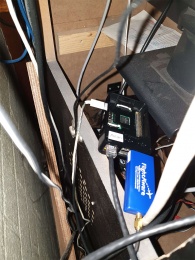Airplane Tracking: Difference between revisions
No edit summary |
(→Todo) |
||
| Line 62: | Line 62: | ||
== Todo == | == Todo == | ||
* Move the RTL-SDR closer to the antenna to minimize signal lost | * <strike>Move the RTL-SDR closer to the antenna to minimize signal lost</strike> this has been done, with great results! | ||
* Make a different antenna/remake the current antenna | * Make a different antenna/remake the current antenna | ||
* Write down to which sites we feed to | |||
Revision as of 00:11, 19 February 2020
| Melan | |
|---|---|
| Participants | Melan |
| Skills | Raspberry pi, Linux, airplanes, radio, rtl-sdr |
| Status | Active as fuck |
| Niche | |
| Purpose | Use for infra |
| Tool | No |
| Location | |
| Cost | |
| Tool category | |
adsb_pi.jpg {{#if:No | [[Tool Owner::{{{ProjectParticipants}}} | }} {{#if:No | [[Tool Cost::{{{Cost}}} | }}
What
A raspberry pi with a RTL-SDR tracking airplanes. Right now it's based on https://github.com/jprochazka/adsb-receiver which provides a nice interface with some statistics, although the project is pretty much dead so eventually we might just put something together ourselves. The pi is accessable as a webinterface on http://planepi.dhcp.nurd.space/
The antenna is located above the bar under the skylight.
How
Automatic Dependent Surveillance Broadcast (ADS-B) is a surveillance technology in which an aircraft determines its position via satellite navigation and periodically broadcasts it, enabling it to be tracked. The information can be received by air traffic control ground stations as a replacement for secondary surveillance radar, as no interrogation signal is needed from the ground. It can also be received by other aircraft to provide situational awareness and allow self-separation. ADS–B is "automatic" in that it requires no pilot or external input. It is "dependent" in that it depends on data from the aircraft's navigation system. This signal is transmitted at 1090Mhz and 978Mhz.
The decoder software (Dump1090) takes in the raw data from the SDR and parses it, we are running the forked version made by Flightradar24, which means the feeder also sends data to Flightradar24. We are also feeding this data to Flightaware and Planefinder.
Hardware
It's running on a Rasberry Pi 2B, the RTLSDR receiver is a Flightaware Pro Stick Plus.
Flightaware Pro Stick Plus
- Chip: R820T2
- Amplifier: 19dB with 0.4dB noise figure and OIP3 +39dB
- TCXO: 0.5 ppm
- Filter: 1,075 MHz to 1,105 MHz pass band with insertion loss of 2.3 dB; 30 dB attenuation on other frequencies
- Power Draw: 300 mA
- Weight: 17 g / 0.6 oz
- Dimensions: 95 mm x 32 mm x 13 mm
- Antenna Port: SMA female (requires SMA antenna cable and optionally N-male adapter for large antenna)
- Range: Over 300 nm/550 km depending on installation quality
- Performance: 10-20% more Mode S messages in installations where filtering is beneficial
Ports
List of all then ports, whom they belong to, and their function.
| Port | Service | Description |
|---|---|---|
| 80 | lighthttpd | Basic Webserver |
| 8080 | Dump1090 | Dump1090 map, doesn't seem to work directly |
| 3002 | Dump1090 | Dump1080 raw data |
| 3003 | Dump1090 | SBS output |
| 3004 | Dump1090 | Dunno |
| 3005 | Dump1090 | Beast? |
| 30053 | PlaneFinder | Planefinder web interface |
Todo
Move the RTL-SDR closer to the antenna to minimize signal lostthis has been done, with great results!- Make a different antenna/remake the current antenna
- Write down to which sites we feed to

